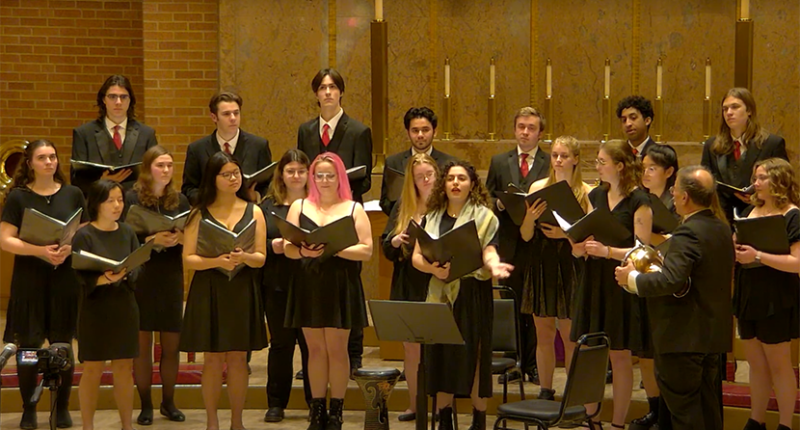During their annual tour in March of this year, St. Lawrence University’s Laurentian choir held classical musical performances throughout the east coast, adding Armenian music, for the first time in 77 years, to their repertoire, thanks to choir member Karni Keushgerian who wanted the choir’s music to reflect its diverse members.
“Most of the music that we do is Western Classical, specifically, renaissance music. The choir’s repertoire is not diverse and does not equally impact students with different identities. I wanted to teach and sing music that was a bit more personal to me to share what diversity within music can look like,” said Keushgerian.
The choir members dived deep into learning and performing two Armenian folk songs, “Hey Jan Ghapama” and “Chem Gerna Khagha” led by Keushgerian, who hails from Beirut, Lebanon and is the only Armenian student in the Laurentian choir.
Keushgerian admits that although as a group, learning how to pronounce and perform the songs was a tough task, it did not take away from any of the fun of learning about Armenian culture. “Classical music, often focused on Western culture, takes a pause when thinking about folk music and oral musical tradition primarily from non-Western cultures,” said Keushgerian. “This questions the hierarchy existing within the musical world. The group considered this as something to explore as they learned more and more about the Armenian songs they were performing,” she added.
For choir director Barry Torres, it was his first time experiencing Armenian music throughout his 25 years at the university. “It’s always a great joy to explore new cultures and present musical expressions of that culture in concert,” said Torres. “It is especially meaningful when the culture is presented to us by a member of that culture. Karni Keushgerian has shared two songs of her native language, Western Armenian, in a very direct way. Her singing of these songs with all the nuance of style was infectious and the Singers naturally picked it up. The extraordinary asymmetrical rhythms and melodies were very attractive and inspiring to the Singers. Their joy in singing this music was plain to see,” Torres added.
Keushgerian believes the Laurentian Singers shared Armenian music with people who had never been exposed to it and states that the response from the audience was overwhelmingly positive and they were thankful for the unique experience.
“The Laurentian Singers were able to share Armenian music to people who had never encountered the sounds of the drums played during ‘Ghapama’ or the beautiful musical and bodily expressions when singing ‘Chem Gerna Khagha.’ The response from the audience was incredible. As they say, it only takes one Armenian to beautifully share Armenian culture, everywhere,” she said proudly.
“I chose ‘Chem Gerna’ because it lyrically and melodically represents the resiliency of the Armenian people through its message. The repetition of the words as well the variation of the melody allowed an interesting juxtaposition between musical sameness and musical diversity. Also, its short verses allowed non-Armenians in the group to become soloists and learn the lyrics, which was very engaging,” added Keushgerian.
“On the other hand, I chose ‘Ghapama’ because of how fun it is and because of its popularity. If there were to be an Armenian in the crowd, they would immediately sing along with the choir. It’s a very fun song to learn and perform!” she continued.
Some soloists who volunteered to sing verses from “Chem Gerna Khagha” included Chantel McCarthy and Macie Cunningham. “I thought that the songs were really fun and enriching to learn. Overall there were some word sounds I had trouble with but after the repetition they got easier to pronounce. I was just super happy to be introduced to the culture by a friend of mine,” said McCarthy.
Similarly, Cunningham resonated with the music for reasons related to community and the importance of it in the lives of Armenians around the world. She described her experience by admitting that she had never heard Armenian music before and did not know what to expect when she discovered the choir was going to learn two Armenian songs. “I was skeptical at first because I didn’t know how ‘Chem Gerna’ would sound with so many people singing at once, but I really like the way it turned out! From what I understood from the music, Armenian people place an emphasis on family and community, which I think is important. ‘Ghapama’ resonated with me for that reason,” she said.
In addition to being entertained, Keushgerian wanted to create a social message for the audiences spanning from New York to Massachusetts and Connecticut to Vermont. “It’s important for non-Armenians to be exposed to Armenian culture for the same reasons why any individual should be exposed to cultures different than their own. To experience an expansive worldview, one must be able to strive for diversity within their lives through hearing the voices of people who are willing to share their experiences. Specifically, in the case of Armenian culture, it is extremely important to raise awareness about the culture to create avenues to talk about Artsakh. With each conversation about Armenian culture, there is an opportunity to empower the voice of a person in Artsakh, waiting to be heard,” she proclaimed.
The entire performance of the Laurentian Singers Spring Concert Tour can be found below:










